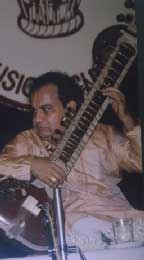 |
| The bride in Ghumayi |
Anarchic Bihar nearly scuttled Nandikar’s National Festival, as Natrang (Jammu) fell prey to railway lawlessness when thugs from Patna assaulted them. The injured director, Balwant Thakur, was hospitalised here, but in the best spirit of “the show must go on”, his team gave a wondrous performance, the highlight of the festival.
Thakur dramatised a simple Dogri folk tale, Ghumayi, about a bride who rejects her callous groom for a chivalrous man who brings water to slake her thirst but dies from his exertion. She declares herself a widow since her husband had told the man he could have her if he brought the water. Thakur beautifully picturises, choreographs and musicalises Ghumayi, using Natrang’s youthful energy. The delicate girl, sad father and men miming mountain waterfalls vivify the wedding and journey homewards, while Suraj Singh’s singing voice is out of this world.
Kalakshetra (Imphal) presented two Manipuri productions. H. Kanhailal has dramatised Tagore’s story Kshudhita Pashan more or less faithfully, except for installing six statues of dancing girls who tantalise the narrator at night, and elaborating the main slave girl’s part.
As in Ghumayi, the oppression of woman is the theme; she is bought and delivered to the badshah, who exploits her physically. Kanhailal is equally sensitive to Tagore’s Meher Ali, whose “Sab jhut hai” makes us wonder what is false: history, romantic visions, our own present life, or everything? Director H. Tomba also captures the ghostly atmosphere when the statues, normally still, move and beckon to the narrator.
The revival of Kanhailal’s Memoirs of Africa (1985) did not fare as successfully. Often a work that once had great relevance seems dated later. This short, stylised nonverbal performance about subjugated races now appears too facile, for everyone accepts its premise. Still, it is good to see Sabitri Heisnam again, dignified and expressive as the representative of suffering humanity. Significantly in Kanhailal’s view, the protagonist is a woman accosted by three covetous men, the oppressors.
Theatre (Dhaka) contributed Chhay Beharar Palki, directed by its junior members, though designed by senior Abdullah Al-Mamun as experimental playwriting arising out of workshops. Differently than Ghumayi, it shows a strong relationship without marriage.
But Zaglul Alam’s script, questioning the marital institution, broaches the subject too cautiously. Perhaps it sounds radical enough in Bangladesh. It turns interesting only toward the end when the couple living together and expecting a baby defy the parents’ plea to marry, but the rebellion gets quickly covered up in family sentimentality.
Alam writes in a ludicrous role of postman for himself, Tropa Majumdar’s acting talent goes to waste on trivial affectations, and Maruf Kabir is the other name in the directorial troika.











